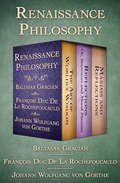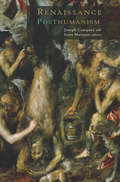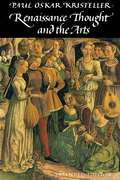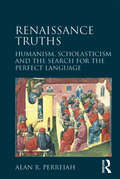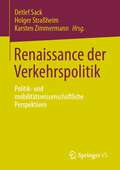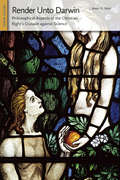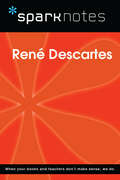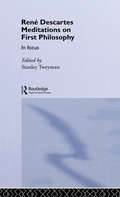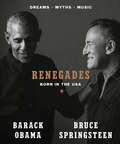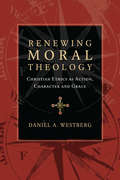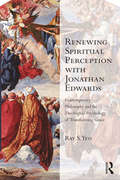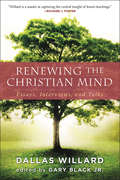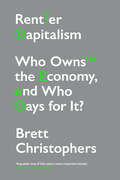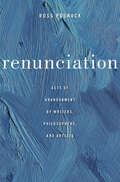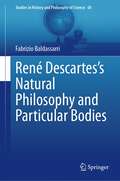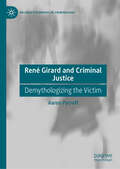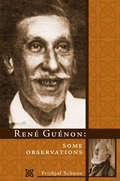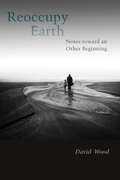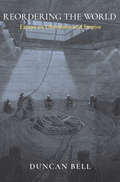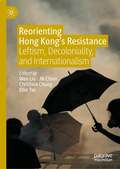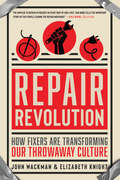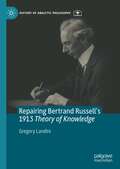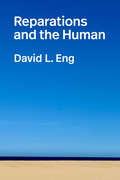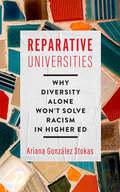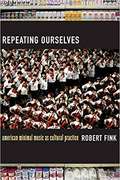- Table View
- List View
Renaissance Philosophy: The Art of Worldly Wisdom; Reflections: Or, Sentences and Moral Maxims; and Maxims and Reflections
by Baltasar Gracián Johann Wolfgang von Goethe François Duc De La RochefoucauldWisdom for today&’s world from three great thinkers of the Renaissance era. This collection of three philosophical works by Renaissance men offers timeless advice on how to prosper and live morally in business, romance, religion, and society. Although written in the Renaissance era, these guides still resonate today and are collected here for easy reference. In The Art of Worldly Wisdom, Baltasar Gracián advises people of all walks of life how to approach political, professional, and personal situations in a dog-eat-dog world. Comprised of three hundred pithy aphorisms, this influential work of philosophy offers thought-provoking and accessible advice. Some subjects include &“Never Compete,&” &“The Art of Letting Things Alone,&” and &“Anticipate Injuries and Turn Them into Favours.&” Reflections; or Sentences and Moral Maxims by François de La Rochefoucauld offers hundreds of brief, brutally honest observations of humankind and its self-serving nature. The perfect read for any realist—or anyone with the desire to evaluate their moral standing—this edition includes three supplements with additional maxims and essays. In Maxims and Reflections, Johann Wolfgang von Goethe takes a detour from his usual literary endeavors and offers snippets of his musings on life, literature, science, nature, politics, and the human condition. Essential for fans of Goethe&’s works, it provides unique insight into the mind of the last true Renaissance man. This ebook has been professionally proofread to ensure accuracy and readability on all devices.
Renaissance Posthumanism
by Joseph Campana and Scott MaisanoConnecting Renaissance humanism to the variety of “critical posthumanisms” in twenty-first-century literary and cultural theory, Renaissance Posthumanism reconsiders traditional languages of humanism and the human, not by nostalgically enshrining or triumphantly superseding humanisms past but rather by revisiting and interrogating them. What if today’s “critical posthumanisms,” even as they distance themselves from the iconic representations of the Renaissance, are in fact moving ever closer to ideas in works from the fourteenth to the seventeenth century? What if “the human” is at once embedded and embodied in, evolving with, and de-centered amid a weird tangle of animals, environments, and vital materiality? Seeking those patterns of thought and practice, contributors to this collection focus on moments wherein Renaissance humanism looks retrospectively like an uncanny “contemporary”—and ally—of twenty-first-century critical posthumanism.
Renaissance Thought and the Arts: Collected Essays
by Paul Oskar KristellerWritten by an eminent authority on the Renaissance, these classic essays deal not only with Paul Kristeller's specialty, Renaissance humanism and philosophy, but also with Renaissance theories of art. The focus of the collection is on topics such as humanist learning, humanist moral thought, the diffusion of humanism, Platonism, music and learning during the early Renaissance, and the modern system of arts in relation to the Renaissance. For this volume the author has written a new preface, a new essay, and an afterword.
Renaissance Truths: Humanism, Scholasticism and the Search for the Perfect Language
by Alan R. PerreiahThough they have long been portrayed as arch rivals, Alan Perreiah here argues that humanists and scholastics were in fact working in complementary ways toward some of the same goals. After locating the two traditions within the early modern search for the perfect language, this study re-defines the lines of disagreement between them. For humanists the perfect language was a revived Classical Latin. For scholastics it was a practical logic adapted to the needs of education. Succeeding chapters examine the concepts of linguistic meaning and truth in Lorenzo Valla’s Dialectical Disputations and Juan Luis Vives’ De disciplinis. The third chapter offers a new interpretation of Vives’ Adversus pseudodialecticos as itself an exercise in scholastic sophistry. Against this humanistic background, the study takes up the concepts of meaning and truth in Paul of Venice’s Logica parva, a popular scholastic textbook in the Quattrocento. To advance recent research on language pedagogy in the Renaissance, it clarifies the connections between truth and translation and shows how scholastic logic performed an essential task in the early modern university: it was a translational language that enabled students who spoke mainly their regional vernaculars to learn the language of university discourse. A conclusion reviews some major themes of the study-e.g., linguistic determinism and relativity, vernacularity and translation, semantical vs. epistemic truth-and evaluates the achievements of humanism and scholasticism according to appropriate criteria for a perfect language.
Renaissance der Verkehrspolitik: Politik- und mobilitätswissenschaftliche Perspektiven
by Detlef Sack Karsten Zimmermann Holger StraßheimDer Band versammelt mobilitäts- und politikwissenschaftliche Beiträge zu verkehrspolitischen Entscheidungen und Richtungswechseln auf verschiedenen Ebenen (Bund, Land, Kommune) und zu verschiedenen Verkehrsträgern bzw. Sektoren (Schiene, Auto). Die Autoren und Autorinnen argumentieren dabei überwiegend empirisch und nutzen unterschiedliche Methoden und Ansätze. Gemeinsam sind den Beiträgen der erklärende Fokus auf mögliche Blockaden der Verkehrswende und neue Perspektiven in der Verkehrs- und Mobilitätspolitik.
Render Unto Darwin: Philosophical Aspects of the Christian Right's Crusade Against Science
by Ph.D. James H. FetzerWith exceptionally clear analysis, James Fetzer dissects the philosophical issues underlying today's most contentious moral debates. <P><P>He examines unflinchingly the controversies where science, religion, and politics meet - intelligent design, creationism, evolution, abortion, stem-cell research, and human cloning - and offers a concept of morality based on respect of individual rights, not religion.
Rene Descartes (SparkNotes Philosophy Guide)
by SparkNotesRene Descartes (SparkNotes Philosophy Guide) Making the reading experience fun! SparkNotes Philosophy Guides are one-stop guides to the great works of philosophy–masterpieces that stand at the foundations of Western thought. Inside each Philosophy Guide you&’ll find insightful overviews of great philosophical works of the Western world.
Rene Descartes' Meditations on First Philosophy in Focus (Philosophers in Focus)
by Stanley TweymanThis volume presents the excellent and popular translation by Haldane and Ross of Descartes' Meditations on First Philosophy, an introduction by Stanley Tweyman which explores the relevance of Descartes' Regulae and his method of analysis in the Meditations, and six articles which indicate the diversity of scholarly opinion on the topic of method in Descartes' philosopy.
Renegades: Born in the USA
by Barack Obama Bruce SpringsteenTwo longtime friends share an intimate and urgent conversation about life, music, and their enduring love of America, with all its challenges and contradictions, in this stunningly produced expansion of their groundbreaking Higher Ground podcast, featuring more than 350 photographs, exclusive bonus content, and never-before-seen archival material. Renegades: Born in the USA is a candid, revealing, and entertaining dialogue between President Barack Obama and legendary musician Bruce Springsteen that explores everything from their origin stories and career-defining moments to our country’s polarized politics and the growing distance between the American Dream and the American reality. <P><P>Filled with full-color photographs and rare archival material, it is a compelling and beautifully illustrated portrait of two outsiders—one Black and one white—looking for a way to connect their unconventional searches for meaning, identity, and community with the American story itself. It includes:• Original introductions by President Obama and Bruce Springsteen <br>• Exclusive new material from the Renegades podcast recording sessions• Obama&’s never-before-seen annotated speeches, including his &“Remarks at the 50th Anniversary of the Selma to Montgomery Marches&” <br>• Springsteen&’s handwritten lyrics for songs spanning his 50-year-long career• Rare and exclusive photographs from the authors&’ personal archives <br>• Historical photographs and documents that provide rich visual context for their conversation In a recording studio stocked with dozens of guitars, and on at least one Corvette ride, Obama and Springsteen discuss marriage and fatherhood, race and masculinity, the lure of the open road and the call back to home. <P><P>They also compare notes on their favorite protest songs, the most inspiring American heroes of all time, and more. Along the way, they reveal their passion for—and the occasional toll of—telling a bigger, truer story about America throughout their careers, and explore how our fractured country might begin to find its way back toward unity and global leadership. <P><P><b>A New York Times Best Seller</b>
Renewing Moral Theology: Christian Ethics as Action, Character and Grace
by Daniel A. WestbergWhile ethical issues are being raised with new urgency, Christians are increasingly unfamiliar with the moral grammar of their faith. The need to reengage the deep-down things of the Christian moral tradition has seldom been more urgent. Moral theology has a long history in the Catholic and Anglican traditions. The tradition of theological ethics, influenced by Aristotle by way of Aquinas, offers a distinct emphasis on the virtues and character formation. Now Daniel Westberg infuses this venerable ethical tradition with a biblical confidence in the centrality of the gospel and the role of the Holy Spirit in forming character, while also laying down a sound moral psychology for practical reason and ethical living. Christians—whether of Anglican, Catholic or of other traditions—interested in vigorously retrieving a great moral heritage, will find here common ground for ethical reflection and discipleship.
Renewing Spiritual Perception with Jonathan Edwards: Contemporary Philosophy and the Theological Psychology of Transforming Grace (Transcending Boundaries in Philosophy and Theology)
by Ray S. YeoJonathan Edwards’ theologically sophisticated psychology of grace remains one of the deepest and most fertile theological psychologies in the Protestant tradition. The heart of his account lies in his foundational doctrine of spiritual perception where he locates the psychological core of the engraced Christian life. This work revisits Edwards’ doctrine from the perspective of recent work in the philosophy of emotions and other related philosophical sub-disciplines. The aim is to recover this often neglected theme in contemporary theology and renew it by bringing Edwards’ theological insights into conversation with various spheres of contemporary philosophical discussion. The account of spiritual perception that emerges from this interdisciplinary dialogue is one that seeks to revise, update and deepen Edwards’ own thinking on the matter in five major ways. The book concludes by arguing that the capacity for spiritual and emotional perception of the supreme good is grounded upon a wisdom-like seminal virtue centred upon the incarnate Christ (i.e., Christocentric wisdom). Such wisdom, on the renewed account, is considered the psychological core of transforming grace and the foundational basis upon which all other Christian virtues are formed.
Renewing the Christian Mind: Essays, Interviews, and Talks
by Dallas Willard Gary Black Jr.From Dallas Willard, one of the most important Christian intellectuals of the twentieth century, comes a collection of readings, interviews, talks, and articles--many previously unpublished.In his groundbreaking books The Divine Conspiracy, The Great Omission, Knowing Christ Today, Hearing God, The Spirit of the Disciplines, The Divine Conspiracy Continued, and The Allure of Gentleness, teacher, philosopher, and spiritual guide Dallas Willard forever changed the way many Christians experience their faith. Three years after his death, the influence of this provocative Christian thinker--"a man devoted to reestablishing the exalted place moral reasoning once held in the academy" (Christianity Today) remains strong.Compiled, edited, and introduced by his friend and fellow theologian, Gary Black, Jr., Renewing the Christian Mind is a collection of essays, interviews, and articles that brilliantly encapsulate Willard's spiritual philosophy and his contributions to theology.Renewing the Christian Mind offers insight into spiritual formation, avocation, and theology, and includes sections directed at specific audiences, from church leaders to laypeople looking for spiritual counsel and nurture. Reasoned, honest, thought- provoking, and illuminating, this important anthology is an invaluable introduction and companion to Dallas Willard's acclaimed body of work.
Rentier Capitalism: Who Owns the Economy, and Who Pays for It?
by Brett ChristophersHow did Britain&’s economy become a bastion of inequality?In this landmark book, the author of The New Enclosure provides a forensic examination and sweeping critique of early-twenty-first-century capitalism. Brett Christophers styles this as &‘rentier capitalism&’, in which ownership of key types of scarce assets—such as land, intellectual property, natural resources, or digital platforms—is all-important and dominated by a few unfathomably wealthy companies and individuals: rentiers. If a small elite owns today&’s economy, everybody else foots the bill. Nowhere is this divergence starker, Christophers shows, than in the United Kingdom, where the prototypical ills of rentier capitalism—vast inequalities combined with entrenched economic stagnation—are on full display and have led the country inexorably to the precipice of Brexit. With profound lessons for other countries subject to rentier dominance, Christophers&’ examination of the UK case is indispensable to those wanting not just to understand this insidious economic phenomenon but to overcome it.Frequently invoked but never previously analysed and illuminated in all its depth and variety, rentier capitalism is here laid bare for the first time.
Renunciation: Acts of Abandonment by Writers, Philosophers, and Artists
by Ross PosnockRenunciation as a creative force is the animating idea behind Ross Posnock's new book. Taking up acts of abandonment, rejection, and refusal that have long baffled critics, he shows how renunciation has reframed the relationship of writers, philosophers, and artists to society in productive and unpredictable ways.
René Descartes’s Natural Philosophy and Particular Bodies (Studies in History and Philosophy of Science #60)
by Fabrizio BaldassarriThis book explores René Descartes’s attempts to describe particular bodies, such as rocks, minerals, metals, plants, and animals, within the mechanistic interpretation of nature of his philosophical program. Despite his early rationalistic epistemology, Descartes’s increasing attention to collections, histories, lists of qualities, and particular bodies results in a puzzling ‘short history of all natural phenomena’ contained in the Principles of philosophy (1644). The present book outlines the role of Descartes's observations and experimentation as he aimed to construct a universal science of nature, ultimately revealing the mechanization of nature in detail, and for curious bodies such as the Bologna Stone or the sensitive herb. What results is a theoretical natural history consistent with the mechanical principles of his philosophy, ultimately shedding new light on his attempt to produce a complete philosophy of nature.
René Girard and Criminal Justice: Demythologizing the Victim (Palgrave Pioneers in Criminology)
by Aaron PycroftThis book highlights the significance of René Girard's work for key criminological debates to provide new perspectives. Girard explores the causes of violence in humans and his work is used to interpret cultural phenomena related to criminology and victimology. The book focuses in particular on Girard’s cultural anthropology of the victim as being foundational to social order. The scapegoat mechanism, as developed by Girard, is an anthropological reading of myth which provides a site of rich dialogue with criminology, victimology, theology and philosophy. The book explores how this provides readers with ontological, epistemological and methodological tools for both explaining and changing the practices of justice.
René Guénon: Some Observations
by Frithjof SchuonRÉNÉ GUÉNON (1886-1951) was the founder of the Traditionalist School. Along with Ananda K. Commaraswamy and Frithjof Schuon, he reintroduced traditional metaphysics and esoterism into Western world after a lapse of centuries, and was perhaps the first to present the doctrines of the Vedanta, Taoism, and Sufism not as Eurocentric orientalists or occult fantasts had done, but strictly in their own terms. To the 'mathematical' precision of Guénon's metaphysics, cosmology, and esoteric history, Frithjof Schuon (1907-1998) added a poetic or 'musical' element, inspired by his close relationship to the Divine Feminine. He also presented the spiritual path as a concrete praxis, involving the spiritual virtues and 'stations of wisdom', that was not so prominent in Guénon's writings. On the other hand, Guénon's prophetic eschatology, especially in The Reign of Quantity and the Signs of the Times, as well as his analysis of the 'counter-tradition', gives him a unexpectedly contemporary 'edge' that is perhaps less prominent in Schuon's more aesthetic approach. René Guénon and Frithjof Schuon illuminate each other, both through their unanimity and the specific points where they differ. Each is almost the only means of taking the other's measure. Questions of who was greater, who more traditional, are finally less interesting that the tremendous vision of human reality and spiritual truth that emerges from their shared role as renewers of traditional metaphysics and religious understanding. Schuon, as the younger man, was in a position to compose an evaluation of his early intellectual master, and in view of his long and illustrious career as an author after Guénon's death, Schuon's central essay René Guénon: Some Observations is also his profoundly appreciative as well as pointedly critical declaration of independence (though simultaneously a declaration of collegiality) from the man who, more than anyone else in the modern world, opened to him a fundamental view of 'principial' reality.
Reoccupy Earth: Notes toward an Other Beginning (Groundworks: Ecological Issues in Philosophy and Theology)
by David WoodHabit rules our lives. And yet climate change and the catastrophic future it portends, makes it clear that we cannot go on like this. Our habits are integral to narratives of the good life, to social norms and expectations, as well as to economic reality. Such shared shapes are vital. Yet while many of our individual habits seem perfectly reasonable, when aggregated together they spell disaster. Beyond consumerism, other forms of life and patterns of dwelling are clearly possible. But how can we get there from here? Who precisely is the ‘we’ that our habits have created, and who else might we be? Philosophy is about emancipation—from illusions, myths, and oppression. In Reoccupy Earth, the noted philosopher David Wood shows how an approach to philosophy attuned to our ecological existence can suspend the taken-for-granted and open up alternative forms of earthly dwelling. Sharing the earth, as we do, raises fundamental questions about space and time, place and history, territory and embodiment—questions that philosophy cannot directly answer but can help us to frame and to work out for ourselves. Deconstruction exposes all manner of exclusion, violence to the other, and silent subordination. Phenomenology and Whitehead’s process philosophy offer further resources for an ecological imagination. Bringing an uncommon lucidity, directness, and even practicality to sophisticated philosophical questions, Wood plots experiential pathways that disrupt our habitual existence and challenge our everyday complacency. In walking us through a range of reversals, transformations, and estrangements that thinking ecologically demands of us, Wood shows how living responsibly with the earth means affirming the ways in which we are vulnerable, receptive, and dependent, and the need for solidarity all round.If we take seriously values like truth, justice, and compassion we must be willing to contemplate that the threat we pose to the earth might demand our own species’ demise. Yet we have the capacity to live responsibly. In an unfashionable but spirited defense of an enlightened anthropocentrism, Wood argues that to deserve the privileges of Reason we must demonstrably deploy it through collective sustainable agency. Only in this way can we reinhabit the earth.
Reordering the World: Essays on Liberalism and Empire
by Duncan BellReordering the World is a penetrating account of the complexity and contradictions found in liberal visions of empire. Focusing mainly on nineteenth-century Britain--at the time the largest empire in history and a key incubator of liberal political thought--Duncan Bell sheds new light on some of the most important themes in modern imperial ideology.The book ranges widely across Victorian intellectual life and beyond. The opening essays explore the nature of liberalism, varieties of imperial ideology, the uses and abuses of ancient history, the imaginative functions of the monarchy, and fantasies of Anglo-Saxon global domination. They are followed by illuminating studies of prominent thinkers, including J. A. Hobson, L. T. Hobhouse, John Stuart Mill, Henry Sidgwick, Herbert Spencer, and J. R. Seeley. While insisting that liberal attitudes to empire were multiple and varied, Bell emphasizes the liberal fascination with settler colonialism. It was in the settler empire that many liberal imperialists found the place of their political dreams.Reordering the World is a significant contribution to the history of modern political thought and political theory.
Reorienting Hong Kong’s Resistance: Leftism, Decoloniality, and Internationalism
by Wen Liu Jn Chien Christina Chung Ellie TseThis book brings together writing from activists and scholars that examine leftist and decolonial forms of resistance that have emerged from Hong Kong’s contemporary era of protests. Practices such as labor unionism, police abolition, land justice struggles, and other radical expressions of self-governance may not explicitly operate under the banners of leftism and decoloniality. Nevertheless, examining them within these frameworks uncovers historical, transnational, and prefigurative sightlines that can help to contextualize and interpret their impact for Hong Kong’s political future. This collection offers insights not only into Hong Kong's local struggles, but their interconnectedness with global movements as the city remains on the frontlines of international politics.
Repair Revolution: How Fixers Are Transforming Our Throwaway Culture
by Elizabeth Knight John WackmanEvery year, millions of people throw away countless items because they don&’t know how to fix them. Some products are manufactured in a way that makes it hard, if not impossible, for people to repair them themselves. This throwaway lifestyle depletes Earth&’s resources and adds to overflowing landfills. Now there&’s a better way. Repair Revolution chronicles the rise of Repair Cafes, Fixit Clinics, and other volunteer-run organizations devoted to helping consumers repair their beloved but broken items for free. Repair Revolution explores the philosophy and wisdom of repairing, as well as the Right to Repair movement. It provides inspiration and instructions for starting, staffing, and sustaining your own repair events. &“Fixperts&” share their favorite online repair resources, as well as tips and step-by-step instructions for how to make your own repairs. Ultimately, Repair Revolution is about more than fixing material objects: in an age of over-consumption and planned obsolescence, do-it-yourself repair is a way of caring for our lives, our communities, and our planet.
Repairing Bertrand Russell’s 1913 Theory of Knowledge (History of Analytic Philosophy)
by Gregory LandiniThis book repairs and revives the Theory of Knowledge research program of Russell’s Principia era. Chapter 1, 'Introduction and Overview', explains the program’s agenda. Inspired by the non-Fregean logicism of Principia Mathematica, it endorses the revolution within mathematics presenting it as a study of relations. The synthetic a priori logic of Principia is the essence of philosophy considered as a science which exposes the dogmatisms about abstract particulars and metaphysical necessities that create prisons that fetter the mind. Incipient in The Problems of Philosophy, the program’s acquaintance epistemology embraced a multiple-relation theory of belief. It reached an impasse in 1913, having been itself retrofitted with abstract particular logical forms to address problems of direction and compositionality. With its acquaintance epistemology in limbo, Scientific Method in Philosophy became the sequel to Problems. Chapter 2 explains Russell’s feeling intellectually dishonest. Wittgenstein’s demand that logic exclude nonsense belief played no role. The 1919 neutral monist era ensued, but Russell found no epistemology for the logic essential to philosophy. Repairing, Chapters 4–6 solve the impasse. Reviving, Chapters 3 and 7 vigorously defend the facts about Principia. Studies of modality and entailment are viable while Principia remains a universal logic above the civil wars of the metaphysicians.
Reparations and the Human
by David L. EngThe Holocaust and the atomic bombings of Hiroshima and Nagasaki invoked in graphic terms the specter of total human destruction. In response, a new international order of reparations and human rights arose from the ashes of World War II. This legal regime sought to subrogate the sovereignty of the nation-state in order to defend the sovereignty of the human being. While the Holocaust’s history is settled—Nazis were perpetrators and Jews were victims—there remains little historical consensus as to the victims and perpetrators of the atomic bombings. In Reparations and the Human, David L. Eng investigates a history of reparations across the Transpacific. He analyzes how concepts of reparation established during colonial settlement and the European Enlightenment shape contemporary configurations of the human and human rights, determining who can be recognized as victims, who must be seen as perpetrators, and who deserves repair. As demands for reparations now occupy center stage in debates concerning unresolved legacies of dispossession and Transatlantic slavery, Eng considers how the Cold War Transpacific provides a limit case for the politics of repair and definitions of the human.
Reparative Universities: Why Diversity Alone Won't Solve Racism in Higher Ed (Critical University Studies)
by Ariana González StokasA timely investigation of why diversity alone is insufficient in higher education and how universities can use reparative actions to become anti-racist institutions.As institutions increasingly reckon with histories entangled with slavery and Indigenous dispossession, diversity, equity, and inclusion (DEI) efforts occupy a central role in the strategy and resources of higher education. Yet reparation is rarely offered as a viable strategy for institutional transformation. In Reparative Universities, Ariana González Stokas undertakes a critical and decolonial analysis of DEI work, linking contemporary practices of diversity to longer colonial histories. González Stokas argues that diversity is an insufficient concept for efforts concerned with anti-oppression, anti-racism, equity, and decolonization. Given its historical ties to colonialism, can higher education foster reconciliation and healing?Reparation is offered as a pathway toward untangling higher education from its colonial roots. González Stokas develops the term "epistemic reparation" to describe a mode of social-historical accountability that can already be seen at work in historical examples, as well as current events in the United States, South Africa, and Canada. Recent legal decisions by Georgetown University and the Princeton Theological seminary to enact economic recompense for buying and selling human beings are evidence of attempts to redress higher education's violent histories and the colonial structures they reproduce every day on college campuses. Engaging with a broad range of theories from decolonial philosophy to organizational psychology, González Stokas offers a pathway—guided by reparative activities—for institutional workers frustrated by what often feels, as Sara Ahmed describes, like "banging one's head against a brick wall." Reparative Universities offers insight into why DEI efforts have been disconnected from past injustices and why unsettling diversity and engaging meaningful repair are critical for the future of higher education.
Repeating Ourselves: American Minimal Music as Cultural Practice
by Robert FinkWhere did musical minimalism come from―and what does it mean? In this significant revisionist account of minimalist music, Robert Fink connects repetitive music to the postwar evolution of an American mass consumer society. Abandoning the ingrained formalism of minimalist aesthetics, Repeating Ourselves considers the cultural significance of American repetitive music exemplified by composers such as Terry Riley, Steve Reich, and Philip Glass. Fink juxtaposes repetitive minimal music with 1970s disco; assesses it in relation to the selling structure of mass-media advertising campaigns; traces it back to the innovations in hi-fi technology that turned baroque concertos into ambient "easy listening"; and appraises its meditative kinship to the spiritual path of musical mastery offered by Japan's Suzuki Method of Talent Education.
